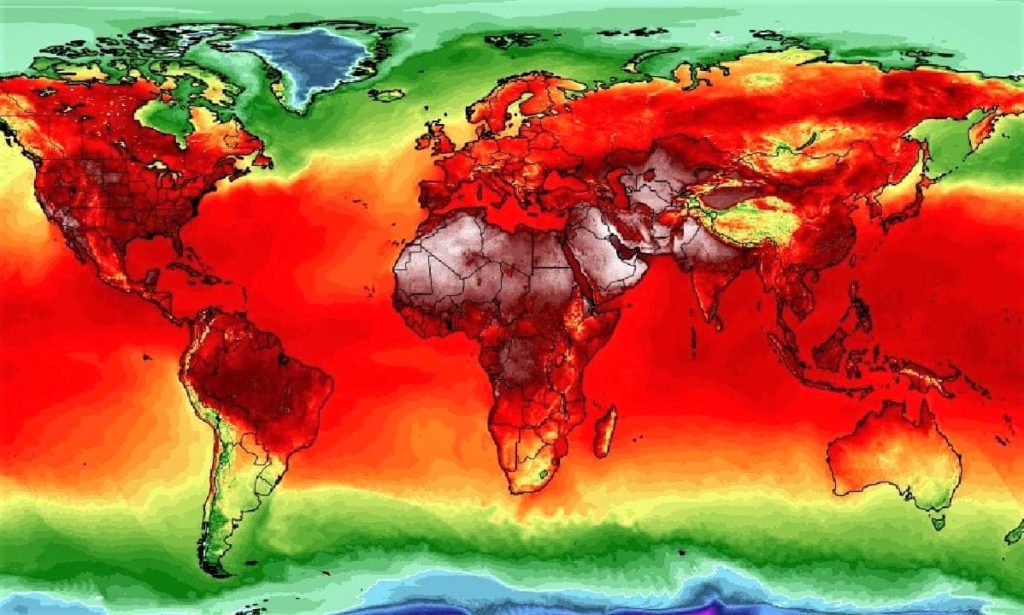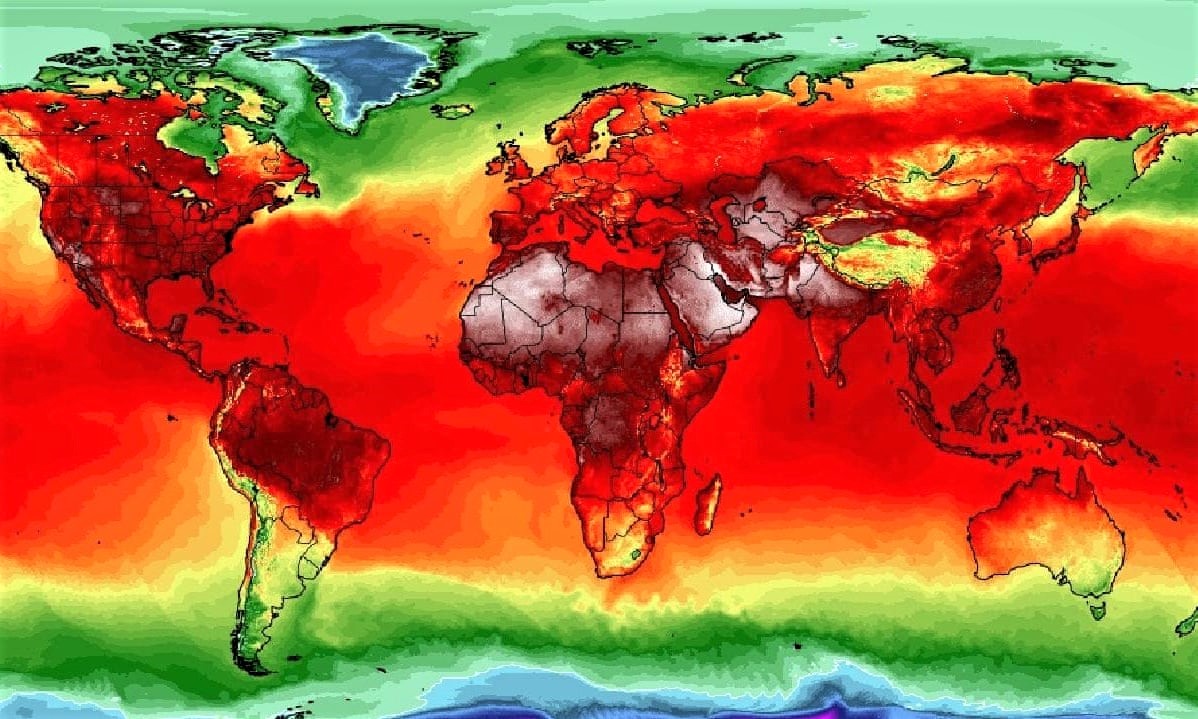The evidence doesn’t get any clearer than this.

A heat map showing how temperatures are soaring across the planet. Photograph: Climate Change Institute/University of Maine
“Do what science demands before it is too late.”
That’s United Nations Secretary General António Guterres in a direct warning to world leaders.
In a press release issued by the Intergovernmental Panel on Climate Change (IPCC) two days ago paints a climate picture far more urgent than we thought.
“ ‘With more than 6,000 scientific references cited and the dedicated contribution of thousands of expert and government reviewers worldwide, this important report testifies to the breadth and policy relevance of the IPCC,’ said Hoesung Lee, Chair of the IPCC.”
For benefit of those sitting in the cheap seats at a Trump rally, let me just repeat, “…more than 6,000 scientific references cited and… thousands of expert and government reviewers worldwide…”
“Ninety-one authors and review editors from 40 countries prepared the IPCC report in response to an invitation from the United Nations Framework Convention on Climate Change (UNFCCC) when it adopted the Paris Agreement in 2015.”
What is the IPCC?
“The Intergovernmental Panel on Climate Change (IPCC) is the UN body,” the release says, “for assessing the science related to climate change. It was established by the United Nations Environment Program (UN Environment) and the World Meteorological Organization (WMO) in 1988 to provide policymakers with regular scientific assessments concerning climate change, its implications and potential future risks, as well as to put forward adaptation and mitigation strategies. It has 195-member states. …
“The good news is that some of the kinds of actions that would be needed to limit global warming to 1.5ºC are already underway around the world, but they would need to accelerate,” said Valerie Masson-Delmotte, Co-Chair of Working Group I.”
That’s the good news, barely.
However, “The report finds that limiting global warming to 1.5°C would require ‘rapid and far-reaching’ transitions in land, energy, industry, buildings, transport, and cities. Global net human-caused emissions of carbon dioxide (CO2) would need to fall by about 45 percent from 2010 levels by 2030, reaching ‘net zero’ around 2050. This means that any remaining emissions would need to be balanced by removing CO2 from the air.”
The Trump administration has announced plans to pull out of the Paris Agreement, an agreement in which every country agreed to reduce its greenhouse gas emissions. However, Russia has not ratified the agreement and based on the political turmoil in Brazil, that country may pull out of the agreement, as well.
According to The New York Times (Oct. 10), “The report Sunday, by the Intergovernmental Panel on Climate Change, looms over the December talks in Katowice, in the heart of Poland’s coal belt. Whether and how the report shapes the content of the negotiations is now being fought over.”
Coal remains an on-going political issue ever since then-candidate Trump said, “We’ve ended the war on beautiful, clean coal,” TIME magazine reported (Aug. 23, 2017). “It’s just been announced that a second, brand-new coal mine,” Trump said, “where they’re going to take out clean coal — meaning, they’re taking out coal. They’re going to clean it— is opening in the state of Pennsylvania, the second one.”
TIME makes clear, “Some coal mining companies undergo a process to wash coal after its extracted to make it increase its quality. This purification process removes some of the pollutants that would otherwise enter the atmosphere, but it could hardly be described as ‘clean.’ ”
However, the practical reality is that “Coal is an industry in decline,” Noah Kaufman of Columbia University said.
But it’s not just because of the environmental hazards.
As reported in The Week magazine (Sept. 21), “There are economic reasons, too. Demand for coal has plummeted over the past decade amid a flood of cheap natural gas from the U.S. fracking boom and advances in wind and solar energy. American coal production dropped 27 percent between 2011 and 2016, with the combined value of the country’s four biggest coal companies falling from $33 billion to $150 million.”
What’s the reaction to the IPCC report?
“It should be a fire under the chairs of the leaders and their negotiators,” said David Waskow, who follows international negotiations for the World Resources Institute, a research organization. “The question right now is, in fact, are leaders going to hear this wake up alarm?” The Times writes.
Britain’s Guardian (Oct. 8), offers a series of charts that show the real risk of rising temperatures.
“ ‘We have presented governments with pretty hard choices. We have pointed out the enormous benefits of keeping to 1.5C, and also the unprecedented shift in energy systems and transport that would be needed to achieve that,’ said Jim Skea, a co-chair of the working group on mitigation. ‘We show it can be done within laws of physics and chemistry. Then the final tick box is political will. We cannot answer that. Only our audience can – and that is the governments that receive it.’ ”
Those who see this as a political issue or a hoax will not be around to see the worldwide consequences.
The science is clear: we either accelerate the reduction of carbon emissions now or we’re cooked.
Comments











